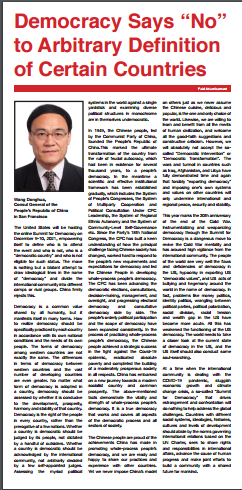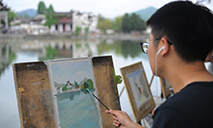Democracy Says “No” to Arbitrary Definition of Certain Countries
On December 9th, 2021, Consul General Wang Donghua published a signed article on San Francisco Examiner entitled Democracy Says “No” to Arbitrary Definition of Certain Countries. In the article, Consul General Wang introduced China’s whole-process people's democracy, criticized the malpractice and hypocrisy of the democracy in the US, and called on all the countries around the world to jointly build a community with a shared future for mankind.
The full text is as follows:
The United States will be hosting the online Summit for Democracy on December 9-10, 2021, empowering itself to define who is to attend the event and who is not, who is a “democratic country” and who is not eligible for such status. The move is nothing but a blatant attempt to draw ideological lines in the name of “democracy” and divide the international community into different camps or rival groups. China firmly rejects this.
Democracy is a common value shared by all humanity,but it manifests itself in many forms. How to realize democracy should be specifically practiced by each country in accordance with its own national conditions and the needs of its own people. The forms of democracy among western countries are not exactly the same. The differences in terms of democracy between western countries and the vast number of developing countries are even greater. No matter what form of democracy is adopted in a country, democracy should be assessed by whether it is conducive to the development, prosperity, harmony and stability of that country. Democracy is the right of the people in every country, rather than the prerogative of a few nations. Whether a country is democratic should be judged by its people, not dictated by a handful of outsiders. Whether a country is democratic should be acknowledged by the international community, not arbitrarily decided by a few self-appointed judges. Assessing the myriad political systems in the world against a single yardstick and examining diverse political structures in monochrome are in themselves undemocratic.
In 1949, the Chinese people, led by the Communist Party of China, founded the People's Republic of China.This marked the ultimate transformation of the country from the rule of feudal autocracy, which had been in existence for several thousand years, to a people's democracy. In the meantime a scientific and effective institutional framework has been established gradually, which includes the System of People's Congresses, the System of Multiparty Cooperation and Political Consultation Under CPC Leadership, the System of Regional Ethnic Autonomy and the System of Community-Level Self-Governance etc. Since the Party's 18th National Congress, the CPC has built a keen understanding of how the principal challenge facing Chinese society has changed, worked hard to respond to the people's new requirements and expectations for democracy and led the Chinese People in developing whole-process people's democracy. The CPC has been advancing the democratic elections, consultations, decision-making, management, and oversight, and progressing electoral democracy and consultative democracy side by side. The people's orderly political participation and the scope of democracy have been expanded consistently. In the process of practicing whole-process people's democracy, the Chinese people achieved a strategic success in the fight against the Covid-19 epidemic, eradicated absolute poverty and completed the building of a moderately prosperous society in all respects. China has embarked on a new journey towards a modern socialist country and common prosperity. The above-mentioned facts demonstrate the vitality and strength of whole-process people's democracy. It is a true democracy that works and covers all aspects of the democratic process and all sectors of society.
The Chinese people are proud of the achievements China has made in promoting whole-process people’s democracy, and we are ready and happy to share our practices and experience with other countries. Yet we never impose China's model on others just as we never assume the Chinese cuisine, delicious and popular, is the one and only choice of the world. Likewise, we are willing to learn and benefit from all the merits of human civilization, and welcome all the good-faith suggestions and constructive criticism. However, we will absolutely not accept the so-called “Democratic Intervention” or “Democratic Transformation”. The wars and turmoil in countries such as Iraq, Afghanistan, and Libya have fully demonstrated time and again that forcibly “exporting democracy” and imposing one's own systems and values on other countries will only undermine international and regional peace, security and stability.
This year marks the 30th anniversary of the end of the Cold War. Instrumentalizing and weaponizing democracy through the Summit for Democracy is a dangerous move to revive the Cold War mentality and has aroused high vigilance from the international community. The people of the world see very well the flaws and deficiencies of democracy in the US, hypocrisy in exporting US “democratic values”, and US acts of bullying and hegemony around the world in the name of democracy. In fact, problems like money politics, identity politics, wrangling between political parties, political polarization, social division, racial tension and wealth gap in the US have become more acute. All this has weakened the functioning of the US democracy. The world needs to take a closer look at the current state of democracy in the US, and the US itself should also conduct some soul-searching.
At a time when the international community is dealing with the COVID-19 pandemic, sluggish economic growth and climate change crisis, a so-called "Summit for Democracy" that drives estrangement and confrontation will do nothing to help address the global challenges. Countries with different social systems, ideologies, histories, cultures and levels of development should abide by the norms governing international relations based on the UN Charter, seek to share rights and responsibilities in international affairs, advance the cause of human progress and make joint efforts to build a community with a shared future for mankind.

Source: Consulate-General of the People's Republic of China in San Francisco
Photos
Related Stories
- Foreign Ministry Spokesperson’s Statement on the “Summit for Democracy” Held by the United States
- Feature: What it takes to build a rural school
- U.S. should stop political manipulation under disguise of democracy: commissioner of Chinese foreign ministry in Macao
- Interview: So-called "Summit for Democracy" criteria abnormal, illogical, says Syrian presidential advisor
- All roads lead to democracy
- Inside China: A Discovery Tour
- Democracy takes different forms, no one-size-fits-all model, Chinese envoy to Guyana says
- So-called "democracy summit" patently "antidemocratic," says Chinese envoy
- What is True Democracy?
- Democracy: A common value of humanity
Copyright © 2021 People's Daily Online. All Rights Reserved.










